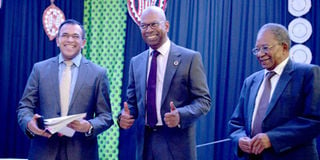Safaricom tight-lipped as Collymore’s tenure nears end

From left-Safaricom limited chief financial officer Sateesh Kamath, chief executive officer Bob Collymore and chairman Nicholas Ng'ang'a. PHOTO | SALATON NJAU | NMG
What you need to know:
- The loud silence by Safaricom on Mr Collymore’s tenure raises queries on the telco’s succession planning.
- The firm is among a few that dominate the Nairobi Securities Exchange for close to two years and give its investors good return on investments.
- Under Mr Collymore, telecommunication giant has also grown in its market value to over Sh785.28 billion.
Leading telco Safaricom’s board of directors has remained tight-lipped on the tenure of the firm’s chief executive Bob Collymore whose term is set to end in August.
Mr Collymore received a two-year extension to his term effective August 2015, meaning he barely has three months to the end of his contract.
He took over from Mr Michael Joseph in August 2010, at the height of price wars with rival Airtel, and was to serve an initial contract of three years. It was renewed for a further two years.
Safaricom board chairman Nicholas Ng’ang’a was yet to respond to our multiple enquiries on the matter, even as Mr Collymore said he could not comment on the terms of his tenure.
“I’m afraid it’s not really my place to comment on the status of my contract. It’s more appropriate for the chairman of the board to comment on my (or indeed any other board member’s) appointment, which I’m sure he will do in good time,” Mr Collymore said in response to our queries.
The loud silence by Safaricom on Mr Collymore’s tenure raises queries on the telco’s succession planning, which is key to ensure smooth operations of the giant telco.
The Capital Markets Authority corporate governance code, which took effect in March this year, says listed firms must ensure there is ‘smooth transition’ in the tenures of board members, which includes chief executives.
Revenues and profits have grown under Mr Collymore’s seven-year reign, to cement Safaricom’s position as a leading player in Kenya’s telecoms industry, and the most profitable listed firm.
It was a rough start for Mr Collymore, whose inaugural investor briefing reported a 13 per cent drop in net profits to Sh13.15 billion in the period ended March 2011 compared to Sh15.14 billion a year earlier.
Net earnings tanked again to Sh12.6 billion in the year to March 2012, on the back of a high stakes price war and undercutting by rival Airtel.
Airtel’s calling rates tumbled to Sh3 per minute from Sh8 per minute within the network, while off-net tariffs were cut to Sh3 a minute from Sh12 per minute – forcing Safaricom to take a huge cut on margins.
But 2013 marked a turning point for Mr Collymore’s reign in the corner office when Safaricom posted a Sh17.53 billion net profit which has grown over the years to hit Sh38.1 billion as at March 2016.
Safaricom’s revenue more than doubled in the past seven years to hit Sh195.6 billion as at March 2016 compared to Sh83.96 billion in 2010.
Mobile money service M-Pesa has blossomed under Mr Collymore's watch to hit 21.5 million users as at December 2016. M-Pesa revenues grew by 27.2 per cent to Sh41.5 billion as at March 2016 to account for a fifth of total revenue.
Under Mr Collymore, telecommunication giant has also grown in its market value to over Sh785.28 billion with a share of the blue chip stock going for Sh19.85.
Forensic audit.
The firm is among a few that have defied the devastating bear run that has griped the Nairobi Securities Exchange for close to two years now to give its investors good return on investments.
Some of the challenges Mr Collymore has weathered at Safaricom include a damning KPMG dossier alleging tender fraud and network outages.
The dossier was tabled in Parliament alleging tendering irregularities amounting to Sh289.4 billion according to a forensic audit done by KPMG.
He also also faced various attempts, most orchestrated by rival firms seeking the help of authorities, including the Parliament in their bid to have Safaricom declared a dominant player in the market and the requisite restrictions placed on it.
Safaricom on April 24th suffered a nationwide outage on voice, data, SMS, M-Pesa, and enterprise services, throwing the economy into darkness.
The Communication Authority of Kenya is currently looking into the incident with Safaricom facing a hefty punishment if found culpable.




